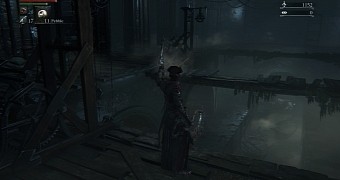After reviewing Bloodborne, I decided to give Dark Souls 2 one more chance. Bloodborne is a truly great game, and I was actually surprised to enjoy it as much as I did, which led me to believe that maybe I should give its little brother another chance.
I was never a big fan of the Souls series, due to several reasons that still stand. I don't like irrelevant speculation regarding clear-cut events, especially when those events are fictitious, which means that someone invented everything and can therefore just put everything in the game to begin with.
The lack of a proper storyline in From Software's games was something that I always found puzzling. Sure, there's ample lore, but obscured in such a manner that it's hard to understand what's going on when you're on your own.
The same goes as far as character stats go, weapons, and pretty much every other area of the game that should have been properly documented in-game.
The way I see things, planes don't fly by harnessing a mysterious force, but instead rely on pretty precise measurements and formulas.
Games work the same way, and it's only a matter of choice on the developer's part to obfuscate it all in order to seem mysterious and cool to people who don't like math and facts.
It's the equivalent of saying that nobody knows how gravity was discovered or came to be, as its origins lie shrouded in the mysterious essence of our human soul and the richness of our history and legacy.
Mystery can place a twist on an otherwise mundane item
You can accept that and scratch your chin in wonder, or pick up a book and see that gravity always existed, and that people studied it and gave it a name and separated it from other natural interactions, and you can even go as far as to find out who worked on what.
Furthermore, you can also discover how we can use their work in order to circumvent some of its limits and essentially predict the future. You can tell whether a gas-filled balloon will get off the ground or not, or how far a big catapult will be able to throw a rock by observing how a tiny model works, and so on and so forth.
That is pretty much what happens whenever you place human beings anywhere. They will study their surroundings and try to see how to tame them and use them to their advantage. They will get to places that were previously inaccessible.
Having a video game world inhabited by people who don't do this means that your humanoid creatures are not actually humans, but contrived creations meant to offer a sense of semblance to travelers and spectators.
This is where I feel the games lose some of their humanity. They are very cryptic, and they trick you into thinking you're an adventurer in a somewhat realistic world that seemingly functions by similar, familiar rules.
I liked the fact that in Fallout 3: New Vegas you could see the farmlands near the big settlements, and the vegetable gardens next to the homes of those who struggled to survive and carve a life in the post-apocalyptic world.
Breaking an established convention is a great way to introduce tension
That gave everything a sense of weight, it made the events unfolding in the game seem more important. It was actually somebody's fate, there were many active players involved.
Dark Souls 2, as far as I got into its "story" so far at least, seems much more static, and even Bloodborne feels that way to some degree. It's like a slice through a dream world that makes no sense, with its own arbitrary rules, discouraging me from trying to understand it.
It's like a big puzzle that you try to put together without having all the pieces. Once you get to the end, you start understanding some things a little better, but there are still many unanswered questions to figure out.
The game worlds seem largely incoherent, like an art piece that is meant to be contemplated for the feelings it evokes rather than for the sense it makes, which is to me contrary to what the essence of a fantasy world should be.
Often times, art is a way to make sense of things that we can't make sense of in a rational manner, but this kind of obfuscation is like pretending that carrots are orange because they are envious of the amount of citric acid in oranges.

 14 DAY TRIAL //
14 DAY TRIAL //